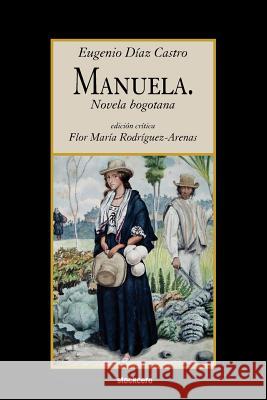Manuela. Novela Bogotana » książka
Manuela. Novela Bogotana
ISBN-13: 9781934768495 / Hiszpański / Miękka / 2011 / 412 str.
By the beginning of the Twentieth Century, Eugenio Diaz Castro, having published Manuela, was already known as the author that had produced the realist novel that was "in its genre, the most faithful copy of reality by art and the most complete that had been written in America" (Cejador y Frauca 1918, 328). The author was a liberal writer that applied the rules of mid-century French Realism in order to describe, present, explain and objectively reproduce reality in the text. He attained this by offering proof of the observed phenomenon so that the reader, basing his/her judgment on the input the author provided would conclude what the state of his society was, and thus, could find the means to correct and improve it. His writing, composed of an effective realism, at times anticipates the arrival of Naturalism as a literary movement, because it examined the depths of human nature and the relationships of mankind with its surrounding society. Manuela's fictional world makes explicit the complexity of the interaction of cultural structures that mediated and interweaved at that time, and expressed the celerity of the flow of ideas which were an integral and central part of the political ideology and the development of novel writing for the group of liberal authors that adopted Realism in the mid-19th Century. Eugenio Diaz Castro belonged to this group of liberal socialist thinkers, who had this to say about his writing: "my pen has been alternate, democratic and extremely popular." This edition, comprising foreword and notes by prof. Flor Maria Rodriguez-Arenas, altogether with the volume Eugenio Diaz Castro: Realismo y Socialismo en Manuela. Novela bogotana by the same author, constitutes the ultimate critical study of a cornerstone of the literature of Colombia.
By the beginning of the Twentieth Century, Eugenio Diaz Castro, having published Manuela , was already known as the author that had produced the realist novel that was "in its genre, the most faithful copy of reality by art and the most complete that had been written in America" (Cejador y Frauca 1918, 328). The author was a liberal writer that applied the rules of mid-century French Realism in order to describe, present, explain and objectively reproduce reality in the text. He attained this by offering proof of the observed phenomenon so that the reader, basing his/her judgment on the input the author provided would conclude what the state of his society was, and thus, could find the means to correct and improve it. His writing, composed of an effective realism, at times anticipates the arrival of Naturalism as a literary movement, because it examined the depths of human nature and the relationships of mankind with its surrounding society. Manuelas fictional world makes explicit the complexity of the interaction of cultural structures that mediated and interweaved at that time, and expressed the celerity of the flow of ideas which were an integral and central part of the political ideology and the development of novel writing for the group of liberal authors that adopted Realism in the mid-19th Century. Eugenio Diaz Castro belonged to this group of liberal socialist thinkers, who had this to say about his writing: "my pen has been alternate, democratic and extremely popular."This edition, comprising foreword and notes by prof. Flor Maria Rodriguez-Arenas, altogether with the volume «Eugenio Díaz Castro: Realismo y Socialismo en Manuela. Novela bogotana» by the same author, constitutes the ultimate critical study of a cornerstone of the literature of Colombia.











